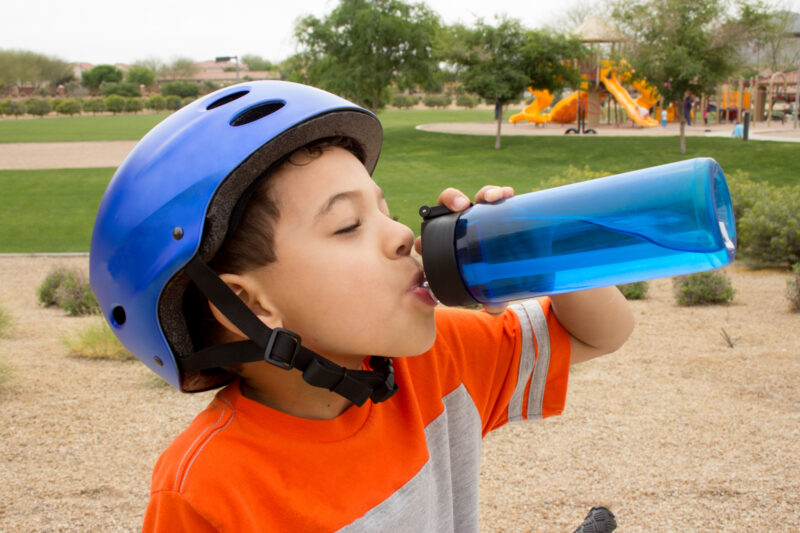Parents, caregivers, and adults will shape the habits and values of the next generation. Recycling materials, reducing our reliance on certain materials, and modeling this behavior for youth can positively benefit our health, our children’s future, and our environment. Decreasing our dependence on single-use plastics can be one way to contribute to this effort. While finding areas to limit or eliminate plastic usage can seem daunting, we can use practical strategies and determination to support helpful changes. Here are some ideas for how to go plastic-free and insights into how this shift can positively impact our health and the environment.
Why Go Plastic-Free?
Plastic products, especially single-use plastics (such as straws, bags, and bottles), pose health and environmental risks due to harmful chemicals like Bisphenol A (BPA) and phthalates (Govind et al., 2023). These chemicals can leach into food and drinks, especially when plastics are heated or washed often, and may contribute to health issues such as hormonal changes, diabetes, obesity, and certain cancers (Kumari et al., 2023). In addition, plastic degrades very slowly. Over time, plastic particles can build up in marine life and introduce toxins into the food chain (Prata et al., 2019). The slow breakdown of plastic can pollute soil and water and may cause irreversible damage to ecosystems and wildlife (Kumari et al., 2023).
Practical Strategies for Going Plastic-Free
- Switch to Reusable Bags and Containers: One way to reduce plastic use is by switching to reusable shopping bags, produce bags, and containers. This change can significantly reduce plastic waste generated from grocery shopping (Kemper et al., 2024).
- Opt for Plastic-Free Packaging: Choose products with minimal or no plastic packaging. Shop at bulk stores where you can bring your own containers and support brands that use sustainable packaging alternatives like glass or cardboard (Kemper et al., 2024).
- Avoid Single-Use Plastics: Avoid single-use plastic items such as straws, cutlery, and water bottles. Instead, invest in durable, reusable alternatives. For instance, stainless steel or bamboo utensils and glass water bottles (Rabiu & Jaeger-Erben, 2024).
- Educate and Involve Children: Teach children about reducing plastic waste. Involve them in activities like shopping for plastic-free products, recycling, and participating in clean-up drives. This can help foster a sense of responsibility and environmental stewardship (Kemper et al., 2024).
Switching to a plastic-free lifestyle may seem challenging at first, but small, consistent changes can make a big difference. Adopting practical strategies and involving our children in these efforts helps protect our health and supports a sustainable future. For more tips and resources on going plastic-free, visit Plastic Free July.
References
Govind, A., & K, N. (2023). Plastic and its side effects on humans – a review article. Asian Pacific Journal of Environment and Cancer, 6(1), 81–85. https://doi.org/10.31557/apjec.2023.6.1.81-85
Kemper, J. A., Spotswood, F., & White, S. K. (2024). The emergence of plastic-free grocery shopping: Understanding opportunities for practice transformation. Journal of Environmental Management, 349. https://doi.org/10.1016/j.jenvman.2023.119290
Kumari, R., Tiwari, R., Akhtar, R., & Gupta, S.K. (2023). Harmful effects of plastics on human health and the environment: A review. Journal of Research in Social Science and Humanities Research, 6(11), 248–255. https://doi.org/10.5281/zenodo.10429234
Prata, J. C., Patrício Silva, A. L., Mouneyrac, C., Walker, T. R., Duarte, A. C., & Rocha-Santos, T. (2019). Solutions and integrated strategies for the control and mitigation of plastic and microplastic pollution. International Journal of Environmental Research and Public Health, 16(13). https://doi.org/10.3390/ijerph16132411
Rabiu, M. K., & Jaeger-Erben, M. (2024). Reducing single-use plastic in everyday social practices: Insights from a living lab experiment. Resources, Conservation and Recycling, 200. https://doi.org/10.1016/j.resconrec.2023.107303

